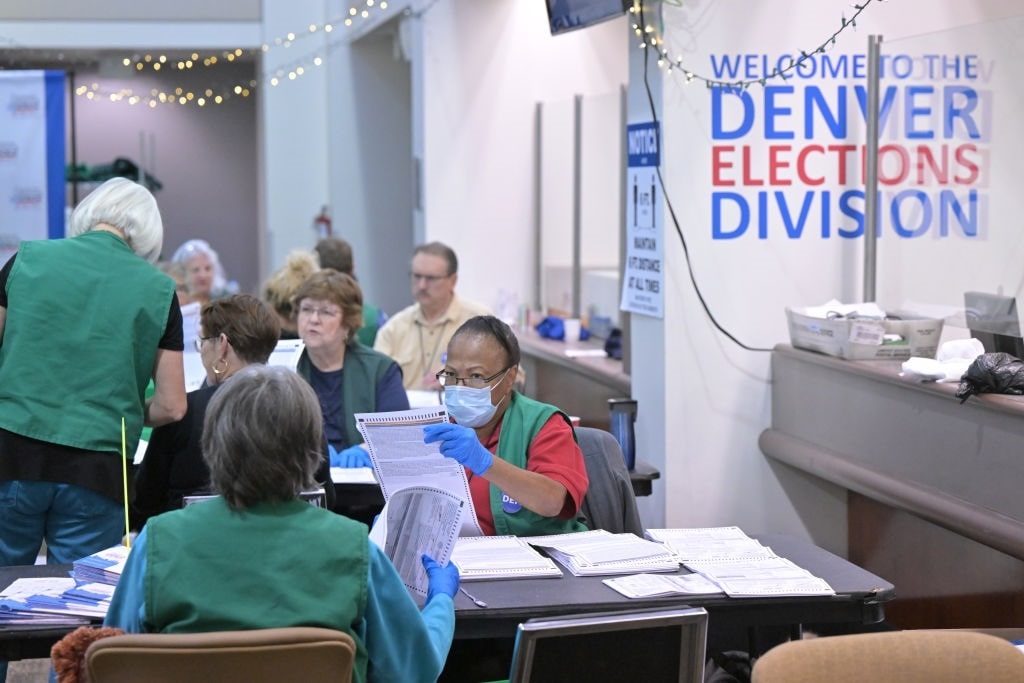Whatever the US Supreme Court Says, Colorado’s primary ballot is set.
The Colorado Supreme Court – or, at least, the four-justice majority that voted to exclude Donald Trump from the state’s primary ballot – got its first taste of humility on Dec. 28. Colorado Secretary of State Jena Griswold confirmed the inevitable, that Trump’s name will indeed be on the ballot for the state’s Super Tuesday presidential primary, March 5, 2024.
Griswold’s announcement came after the Colorado Republican Party filed an appeal to the US Supreme Court against the Colorado Supreme Court decision in Anderson v. Griswold. The left-wing group Citizens for Responsibility and Ethics in Washington sued to have the 45th president removed from the ballot, citing the 14th Amendment’s “disqualification clause.” The state’s highest court ruled 4-3 in the group’s favor, saying that because Trump had engaged in “insurrection,” he was ineligible to run for elected office.
Meanwhile, in Maine, Secretary of State Shenna Bellows didn’t wait for a lawsuit to jump on the ban-Trump bandwagon. On Dec. 28, Bellows announced Trump’s removal from the primary ballot in her state.
The Colorado opinion included a stay until Jan. 4, 2024, pending a potential appeal. Under Colorado election law, Jan. 5 is the “Last day for Secretary of State to certify the names and party affiliations of the candidates to be placed on the March 5th Presidential Primary Election ballot.” The decision in Maine is also subject to appeal and Trump spokesman Steven Cheung said an appeal would be forthcoming. On the X platform, the Trump campaign described Bellows as “a virulent leftist and a hyper-partisan Biden-supporting Democrat who has decided to interfere in the presidential election on behalf of Crooked Joe Biden.”
Colorado Election Deadlines

(Photo by Hyoung Chang/The Denver Post)
Here is where things get confusing for Colorado. Fox News reports, “The U.S. Supreme Court has a ticking political time bomb on its hands: the body will have to decide the case before Super Tuesday, March 5.” The Court begins its first session of 2024 on Jan. 8 – three days after the Colorado ballot is certified. But there’s another catch: Colorado has several election deadlines to meet, all of which fall well before the March 5 primary.
Primary ballots must be sent out to deployed military voters by Jan. 20. County clerks must begin issuing mail ballots to “any eligible elector who requests one in person” on Feb. 2. Ten days later, the state begins mailing ballots to voters and, on Feb. 20, the counting of mail ballots begins.
While the US Supreme Court is not obliged to operate on anyone else’s timeline, it would need to issue a ruling or decline to take up the appeal before Jan. 20. Whatever the Court says after that would be meaningless unless the Colorado Secretary of State is willing to bend her election laws and remove a major party candidate from the ballot even after it has been certified and issued. March 5, as a deadline for a ruling, is irrelevant.
Perhaps Democrats may come to regret their seemingly limitless promotion of early and mail-in voting. There appears to be no “loophole” in Colorado’s election law that would enable Griswold to remove Trump from the ballot even any time after the certification deadline of Jan. 5 – before the US Supreme Court will make any decision on the Republicans’ appeal. With no opinion and no rejection of that appeal, the matter is still ongoing and there is no legitimate way to disqualify anyone who is already on the ballot.
If the state had not created such a big window of time for voting, it would have almost certainly gotten its answer from the Supreme Court well before it needed to certify the 2024 primary ballot.
It seems extremely unlikely that the US Supreme Court will decline to hear the appeal of the Colorado ruling. The majority opinion in the Anderson v. Griswold case was, after all, founded on an interpretation of a clause in the US Constitution. Also, there are similar ongoing attempts to remove Trump from ballots in Nevada, Wisconsin, and Texas. Making it even more unlikely that the nation’s highest court would pass on the appeal is the ruling by the Michigan Supreme Court that no provision in that state’s election laws allows for the striking of Trump’s name from the Michigan ballot.
Similarly, the Minnesota Supreme Court had already thrown out an attempt to strike the leading GOP challenger from the ballot. As Minnesota Secretary of State, Steve Simon observed, “[Trump] will either be on the ballot everywhere or nowhere, and the U.S. Supreme Court is going to make sure of that.”
With contradictory decisions coming out of different states and at least three more facing similar legal actions, the US Supreme Court will surely take up the matter of the 14th Amendment. Michigan and Minnesota effectively deferred to their federal counterpart, as did the Colorado Supreme Court and Bellows in Maine. The same is likely to happen in all the other states dealing with these attempts to disqualify Trump.
The US Supreme Court does not need to issue an opinion on whether the events of Jan. 6, 2021, rose to the level of insurrection. The real question is whether section three of the 14th Amendment applies to the office of president of the United States. If it concludes that the clause does not, then all current state-level attempts to disqualify Trump will fall outside the Constitution.

